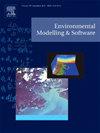PSLSA v2.0: An automatic Python package integrating machine learning models for regional landslide susceptibility assessment
IF 4.8
2区 环境科学与生态学
Q1 COMPUTER SCIENCE, INTERDISCIPLINARY APPLICATIONS
引用次数: 0
Abstract
Accurate landslide susceptibility assessments (LSA) are crucial for civil protection and land use planning. This study introduces PSLSA v2.0 as an open-source Python package that can conduct LSA automatically. It integrates six sophisticated machine learning algorithms (C5.0, SVM, LR, RF, MLP, XGBoost), and allows arbitrary combinations of influencing factors to generate landslide susceptibility index (LSI). We demonstrate how factor contribution and hyperparameter optimization as additional outputs can enhance the model interpretability. We apply PSLSA to a case study focused from Linzhi City in the Tibetan Plateau of China, that has undergone significant engineering modifications on its slopes. The results reveal that slope and aspect are the dominant factors in determining landslide susceptibility. All the six algorithms have an accuracy of over 80%. Although the distribution patterns of LSI vary, the C5.0 model is set apart with the best performance. PSLSA provides a powerful tool for stakeholders especially the non-geohazard professionals.
PSLSA v2.0:一个集成区域滑坡易感性评估机器学习模型的自动Python包
准确的滑坡易感性评估对民防和土地利用规划至关重要。本文介绍的PSLSA v2.0是一个开源的Python包,可以自动进行LSA。它集成了六种复杂的机器学习算法(C5.0、SVM、LR、RF、MLP、XGBoost),并允许任意组合影响因素生成滑坡易感性指数(LSI)。我们展示了因子贡献和超参数优化作为附加输出如何增强模型的可解释性。我们将PSLSA应用到中国青藏高原林芝市的一个案例研究中,该案例对其边坡进行了重大的工程改造。结果表明,边坡和坡向是决定滑坡易感性的主导因素。6种算法的准确率均在80%以上。虽然LSI的分布模式各不相同,但C5.0模型的性能最好。PSLSA为利益相关者特别是非地质灾害专业人员提供了一个强大的工具。
本文章由计算机程序翻译,如有差异,请以英文原文为准。
求助全文
约1分钟内获得全文
求助全文
来源期刊

Environmental Modelling & Software
工程技术-工程:环境
CiteScore
9.30
自引率
8.20%
发文量
241
审稿时长
60 days
期刊介绍:
Environmental Modelling & Software publishes contributions, in the form of research articles, reviews and short communications, on recent advances in environmental modelling and/or software. The aim is to improve our capacity to represent, understand, predict or manage the behaviour of environmental systems at all practical scales, and to communicate those improvements to a wide scientific and professional audience.
 求助内容:
求助内容: 应助结果提醒方式:
应助结果提醒方式:


